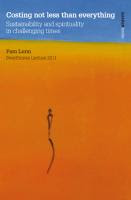* * * * *
Humanity is surpassing nature’s budget for the year, and is now operating in overdraft, according to Global Footprint Network calculations for 2011.
Earth Overshoot Day, which this year falls on September 27, helps conceptualise the degree to which we are over-budget in our use of nature. In approximately nine months, we are demanding a level of ecological services – from producing food and raw materials to filtering our carbon dioxide emissions — equivalent to what the planet can provide for all of 2011. From an ecological standpoint, we have effectively spent our annual salary, with a quarter of the year still to go.
“From soaring food prices to the crippling effects of climate change, our economies are now confronting the reality of years of spending beyond our means. If we are to maintain stable societies and good lives, we can no longer sustain a widening budget gap between what nature is able to provide and how much our infrastructure, economies and lifestyles require.”(Global Footprint Network President Dr. Mathis Wackernagel)

Meeting the Needs of 7 Billion
This year, Earth Overshoot Day comes as the UN is projecting the human population to reach 7 billion sometime in late October. Current resource trends pose these questions:
- How will we be able to meet the needs of a growing population?
- Support the increased consumption as millions in emerging economies join the swelling ranks of the middle class?
- Provide for the 2 billion alive today that lack access to enough resources to meet basic needs?
Global Footprint Network’s preliminary 2011 calculations show that the rate we are now using resources would take between 1.2 and 1.5 planets to sustainably support. If we continue on the course estimated by (the very moderate) United Nations projections for increasing population and consumption then, by well before mid-century, we will need the capacity of two Earths to keep up with our level of demand.
“Providing good lives for the world’s people is certainly possible – but it will not be possible using the resource-intensive development and growth models we have pursued in the past. That means finding new models of progress and prosperity that limit demand on ecological assets. It also means maintaining the resources we have left as an ongoing source of wealth rather than liquidating them for fast cash.”(Global Footprint Network Director of Research and Standards, Dr. Juan Carlos Morales)
Have We Reduced Global Overshoot?
The Ecological Footprint and biocapacity calculations that Global Footprint Network made last year placed Earth Overshoot Day a few weeks earlier in the year than this year’s estimates do. This has raised the question as to whether we have reduced global overshoot. The answer, unfortunately, is no. Global Footprint Network is constantly improving the calculations and data sets that are the basis for determining Earth Overshoot Day, and as such the date shifts from year to year.
Currently, we are undertaking some revisions to the way we compare productivity across different geographies and land types – forests in Russia, for example, as compared to fishing ground in Chile. If we look at where Earth Overshoot Day would have fallen over time based on these new assumptions (which we are still testing), we would see overshoot continuing to grow slightly year on year. (Learn more about these revisions, and when Earth Overshoot Day would have fallen over time using our most current assumptions.)
It is not, of course, able to determine with 100 percent accuracy the exact moment when we bust our budget. Hence, Earth Overshoot Day is meant as an estimate rather than as an exact date.
Our methodology does change and may continue to shift, but no matter what scientific approach we have used, and what improvements we have implemented to try to account for both human demand and nature’s supply, the trends remain consistent: we are in significant overshoot, and overshoot is growing.
The 'when' is less important than the 'what': a mounting ecological debt, and the interest we are paying on that debt – food shortages, plummeting wildlife populations, disappearing forests, degraded land productivity and the build-up of CO2 in our atmosphere and ocean, with devastating human and monetary costs.
Overshoot and the Global Economy
In spite of the global recession, resource trends indicate that since October 2008, humanity’s resource demand has been on the rise, although more slowly than in the first eight years of the millennium.
There is more and more evidence that rapidly rising resource costs, in particular for food and energy, played a major role in accelerating, if not sparking, the current global downturn. Now we are trying to reverse the downturn by building jobs and stabilising our economies. But this depends on a reliable resource supply.
“As resource constraints tighten even more, it’s going to feel like trying to run upward on a down escalator. As we look to rebuild our economies to be healthy and robust, now is the moment to come up with ways of doing so that will continue to work and be relevant in the future. Long-term recovery will only succeed, and can only be maintained, if it occurs along with systematic reductions to our dependence on resources.”(Dr. Wackernagel)
We are moving to a new paradigm – from one in which resources were treated as limitless to one in which they must be as prudently spent and as carefully managed as financial reserves.
Global Footprint Network and its network of partners is working with individuals, organisations and governments around the globe to make decisions that are aligned with ecological reality – decisions that can help close the ecological budget gap and provide for a prosperous future in the face of changing and challenging resource trends.
• Learn more about Earth Overshoot Day
• Still wondering, “What is Overshoot?” Watch this video
